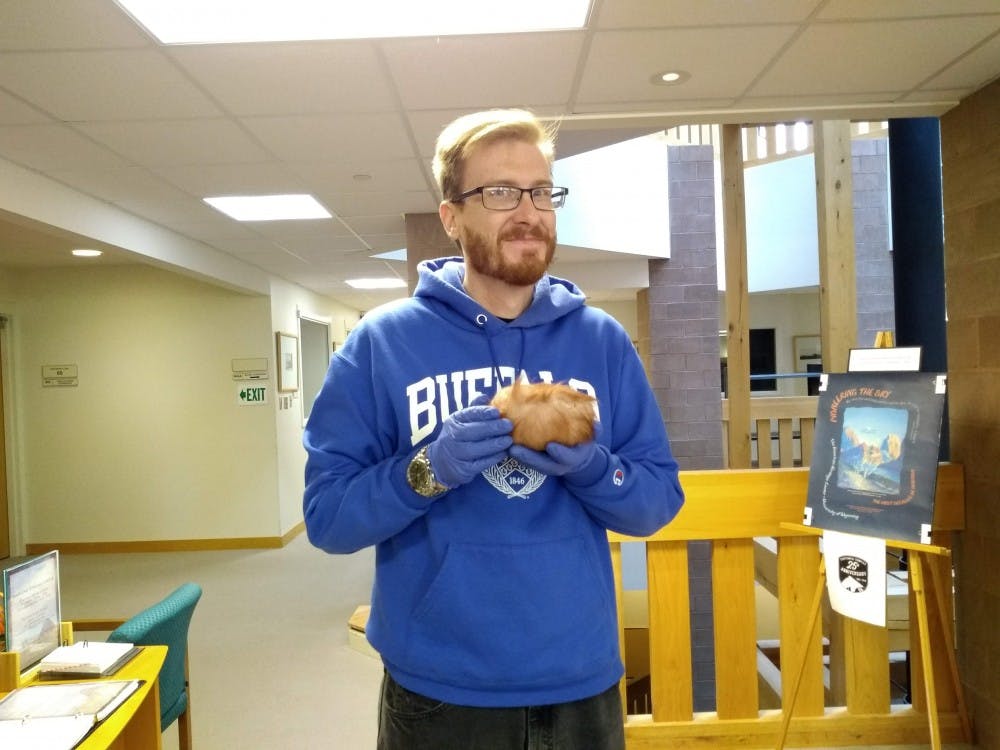Richard Deverell was an undergraduate at SUNY Brockport when his professor assigned him a paper on the “history of anything.”
Most of his peers researched their family histories for the assignment.
Deverall decided to flip through comic books instead.
He explored how Marvel comics played a role in “shaping people’s idea of the 20th century.”
“It’s something that’s very different so [my peers] found that kind of neat,” Deverell said. “They started asking me questions like, ‘What was going on during this time period?’ or ‘What do you think of this?’ … I [was just] finding out that there is a place for this interest.”
Deverell, a Ph.D candidate in the history department and self-described “comic book nerd,” now studies the Comics Code Authority — a code created in 1954 by the Comics Magazine Association of America to censor comic books and regulate what was published. The code lasted the comic industry until 2011.
Deverell travels the country to look in the archives of comic book legends like Stan Lee -- whose work he studied just a month before Lee's death -- but most of his sources come from $3 Ebay purchases. His research examines the history of the code and why it took so long to phase out, he said.
Deverell came to UB for his Ph.D. in 2016 to explore comic censorship and the CCA.
The code prevented nudity, offensive language and villans being humanized in comic books. He found that industry regulars fought the censorship throughout history and argued for code revisions.
Marvel frontman Lee played a big role in pushing the CCA’s first revision in the ‘80s, according to Deverell. He said this push allowed villains in books to be “seen as people” and allowed writers to reference drugs.
Deverell recently traveled to the University of Wyoming’s American Heritage Center to explore Lee’s work. He said, when the CCA ended in 2011, its records were destroyed by those in the industry. Still, Lee, as a publisher at Marvel, kept these records in his files. Deverell was able to use the information for his research and explore the mind of a comic book icon firsthand.

Richard Deverell’s workspace during his time studying Stan Lee’s papers at the American Heritage Center. Deverell looked through Lee’s work just a month before the comic legend’s death last week.
“The first day I came across something that wasn’t just a photocopy but actually had his signature on it, it felt like holding a sacred text,” Deverell said. “When you grow up, Stan Lee is this larger-than-life figure and there [was] just his internal memorandums signed by him right there.”
Deverell also visited Columbia University at Chris Claremont's archives. Claremont is known for his contributions to the X-Men series.
But Deverell doesn’t have to travel too much for his research.
Most of his study materials come from rare interviews with comic book artists and writers in old issues of trade magazines. These magazines usually cost Deverell $3 to $4.
“My friends in my department are studying European history so they’ve gone over to England and Europe for archives and here I am on Ebay buying my sources.”
Derek Taylor, a Ph.D. candidate in the history department, has known Deverell for over two years. He said Deverell’s work is potentially groundbreaking since few professors at UB or across the country have experience studying comics. He said this may make it difficult to be accepted by the academic community, but he finds his friend’s drive to prove otherwise admirable.
“People and programs understandably want a proven formula to invest in for a better chance at a positive return,” Taylor said. “He understands this, yet is driven to successfully bring the history of comics to a more central position in the study of American cultural and social history.”
Deverell said he hopes this research can make an impact on how people react to new media and forms of art.
“I hope to be able to show just how complex an issue censorship is and how the different values governments, businesses and consumers place upon mass media shapes both it and those groups over time,” Deverell said.
“In light of recent concerns over video games, phone apps and social media, it is clear that all new forms of media face scrutiny, particularly when their consumers are children or teenagers, and learning from the panic over comic books can help ensure a measured, informed response to novel media.”
Brenton Blanchet is the managing editor and can be reached at Brenton.Blanchet@ubspectrum.com and on Twitter @BrentBlanchSpec.

Brenton J. Blanchet is the 2019-20 editor-in-chief of The Spectrum. His work has appeared in Billboard, Clash Magazine, DJBooth, PopCrush, The Face and more. Ask him about Mariah Carey.





